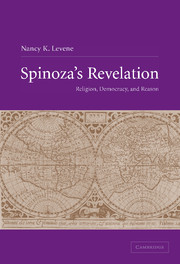Book contents
- Frontmatter
- Contents
- Preface
- Acknowledgments
- List of abbreviations
- Introduction
- 1 Vera religio
- 2 Spinoza's Bible: Concerning how it is that “Scripture, insofar as it contains the word of God, has come down to us uncorrupted”
- 3 Politics, law, and the multitude
- 4 Reason, revelation, and the case of the Hebrews
- Conclusion
- Bibliography
- Index
2 - Spinoza's Bible: Concerning how it is that “Scripture, insofar as it contains the word of God, has come down to us uncorrupted”
Published online by Cambridge University Press: 22 September 2009
- Frontmatter
- Contents
- Preface
- Acknowledgments
- List of abbreviations
- Introduction
- 1 Vera religio
- 2 Spinoza's Bible: Concerning how it is that “Scripture, insofar as it contains the word of God, has come down to us uncorrupted”
- 3 Politics, law, and the multitude
- 4 Reason, revelation, and the case of the Hebrews
- Conclusion
- Bibliography
- Index
Summary
If we read a book relating events which are incredible or incomprehensible, or which is written in a very obscure style, and if we do not know the author or the time or the occasion of its composition, it will be vain for us to try to achieve a greater understanding of its true meaning (TTP, 100) … I call comprehensible those narratives, whether of future or past events, that do not exceed human belief, and likewise laws, institutions and customs, although they cannot be proved with mathematical certainty. But mysterious symbols, and narratives that exceed all human belief, I call incomprehensible. Yet even among these there are many that yield to examination by our method, so that we can perceive the author's meaning.
(TTP, 241)If a man reads the narratives of Holy Scripture and has complete faith in them, and yet pays no heed to the lesson that Scripture thereby aims to convey, and leads no better life, he might just as well have read the Koran or a poetic drama or at any rate ordinary history.
(TTP, 69–70)[S]ince reason cannot demonstrate the truth or falsity of this fundamental principle of theology, that men may be saved by obedience alone, we may also be asked why it is that we believe it? If we accept this principle without reason, blindly, then we too are acting foolishly without judgment; if on the other hand we assert that this fundamental principle can be proved by reason, then theology becomes a part of philosophy, and inseparable from it. To this I reply that I maintain absolutely that this fundamental dogma of theology cannot be investigated by the natural light of reason, or at least that nobody has been successful in proving it, and that therefore it was essential that there should be revelation.
(TTP, 174–175)- Type
- Chapter
- Information
- Spinoza's RevelationReligion, Democracy, and Reason, pp. 77 - 135Publisher: Cambridge University PressPrint publication year: 2004



